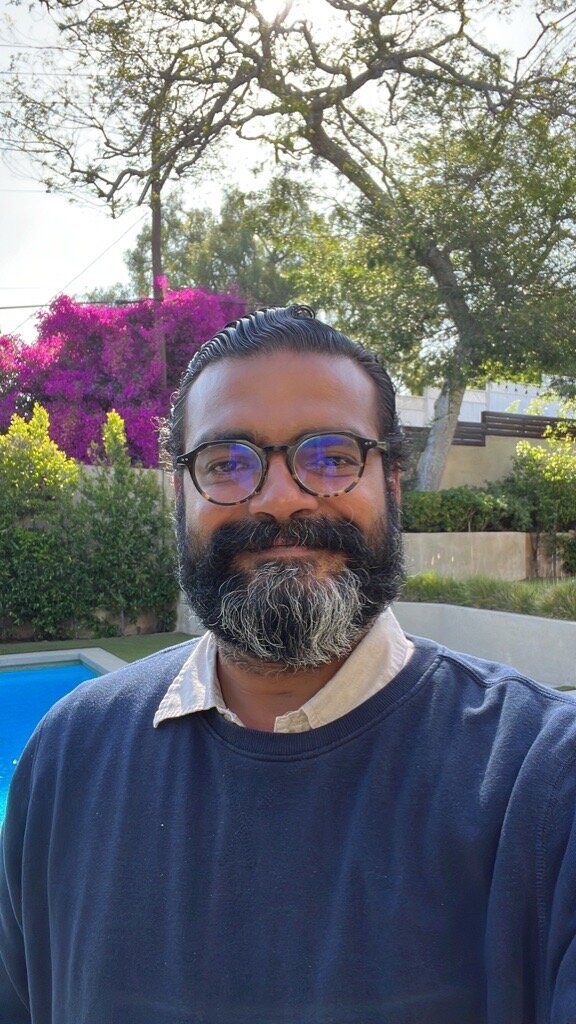As far as spectacular falls from grace shake out, Theranos’ beleaguered founder Elizabeth Holmes — recently convicted of fraud amid a squalling media frenzy — serves as a cautionary tale of the start-up world’s mercurial nature. Given the damning reports exposing long unchecked chicanery, we can’t help but wonder: was the once celebrated founder ultimately undone by the cult of personality that had, by the same token, propelled her brand?
Public relations guru Jacob Puthenparambil likens the latter’s downfall to a bubble popping. “To an extent, all entrepreneurs want to create a persona and show where they want to take their team, clients and investors, but it has to have some attachment to reality,” he cautions.
The CEO of Redhill is no stranger to the trope of the rising start-up star, flush with self-assurance and funding. Leading a global PR agency ranked on Financial Times’ list of Asia-Pacific’s high-growth companies in 2022, he’s represented a nexus of high-profile start-ups led by luminous young trailblazers — including Grab and recently minted local health-tech unicorn Biofourmis.
Despite the obvious ‘spin doctor’ sobriquet breezily tagged to his profession, he suggests he isn’t in the business of burnishing flimsy card houses — nor does he pander to clients’ inflated egos. “There’s a Persian saying that the best poison you can give someone is a compliment because it feeds directly into their hubris,” he asserts.
“With my clients, including VCs and tech start-ups, we have 31-year-olds who are now hundreds of millions of dollars in net worth, and I tell them what the reality is — where they are wrong and what they are doing good. Over time, they appreciate it as they would otherwise be surrounded by yes men encouraging them to adopt a persona they are not,” he adds. And he’s proven to be a sturdy sounding board. “I tell them that reputation is not about promotion, but more about consistency, much like your currency that helps you in your business and personal life,” he muses.
Puthenparambil himself doesn’t appear to conform to the archetype of the silver-tongued publicist, who delicately sidesteps fodder with the slightest whiff of controversy. His Facebook page is interspersed with posts on Indian politics; he expresses solidarity with the Communist Party of India (Marxist) for its focus on quality of life, rather than incendiary rhetoric.
“The national media scene in India has become too toxic in the sense that if you watch prime time news you will develop health issues such as high blood pressure,” deadpans the Indian national, who moved his family to Singapore when he started Redhill in 2014.
He doesn’t avoid engaging in polemics either. Just scroll through his Twitter feed for that sharply worded thread rehashing the Builder.ai saga, complete with posts pillorying the offending (and tagged) reporters. A Redhill client, the company — formerly known as Engineer.ai — was once accused in a Wall Street Journal article of exaggerating its AI capabilities. In the fallout of the story, Builder.ai’s founder, Sachin Dev Duggal released an assiduously detailed screed disputing its claims. Their reputational dent may have been mended; the company recently raised $100 million in a Series C funding round.
Today, on a rainy Monday afternoon at The Tanglin Club, he draws my attention to the case to characterise his antipathy towards cancel culture. “Nobody gets anything by dismissing people like that. You need to have an encouraging environment; even if you fall and have your flaws everybody needs a chance,” he asserts. I note, silently, a shrewdly seized moment to showcase nimble crisis management. But isn’t being a savvy opportunist key to good PR?
The global soul
Born to a family of traditional landowners turned white collar professionals in the Keralan hillside town of Kothamangalam, Puthenparambil migrated to Saudi Arabia as a child when his father set up a fibre glass factory there. The six-year-old spoke no English but endeared himself to their Korean neighbours after ferreting out their stray golf balls from the arid desert banking their backyards.
That may have been a harbinger of his current business philosophy. “Historically it has always been the givers who’ve succeeded rather than takers, because if someone constantly comes to you asking for help then it comes across as very transactional. If you are genuinely going out of your way to help someone, your value goes up by way of metacommunication,” he explains, lending that this logic was borne out in numerous relationships of Redhill’s that blossomed from non-contractual favours.
In grade school, the protective brother once threatened his sister’s school bus bully with the pointed divider from his compass set. “You have to stand up for the little man. It’s our national policy to stand up for Ukraine; yes, Russia is huge with nuclear powers but if you don’t make a stand then who is going to be there for you when it is your turn? It goes back to your currency, you have to earn your value to keep it,” he muses.
After completing his formal education in India, Puthenparambil returned to the Middle East to help prop up his father’s struggling business, which would lay the groundwork for steering a profitable venture. “When I started Redhill, we were very clear that we didn’t want to go a month with any deficit or spend anything we did not have. We only took our first ever loan to buy another agency, which was mostly funded by our cash,” he shares.
Working in a region squarely positioned at the crossroads of trade held its own cultural idiosyncrasies and takeaways, such as the intrinsic value of interpersonal relationships. “A lot of businesses in the Middle East are waiting for that black swan event; on a day-to-day basis they may be losing a little money and then all of a sudden something happens like the war in Ukraine. Business may not be constant but if you keep meeting people it will pay off,” he explains.
“I also learnt not to worry about small things like scheduling as timing is very flexible in the Middle East. An Arab businessman would tell you to come to his majalis after evening prayers and while waiting for him you may meet other people and take it from there,” he recalls.
The self-professed geography geek would later fly the coop, striking out on his own with publishing stints in Dubai, where he profiled behemoths such as Amitabh Bachchan and Richard Branson. When that ran its course, he joined telecommunications giant du, then a fledgling enterprise, felt stultified by corporate predictability and once again circled back to India where he was appointed Director Officer on Special Duty (OSD) to Minister of State for External Affairs. Somewhere between these resume-shining sorties, he entered a traditional arranged marriage that produced three children.
-

Jacob Puthenparambil, CEO of Redhill -

Jacob Puthenparambil and his wife
It’s hardly sui generis for a media professional to establish a career in PR — ‘crossing over to the dark side’, as the rinsed-out metaphor would have you believe. But perhaps what’s remarkable about the 43-year-old’s entrepreneurial journey is its fleet-footed ascent from bareboned setup bootstrapped with $2,000, to full-service global communications agency that rakes in a $20 million revenue in under a decade.
This year, the company acquired Hong Kong-based Creative Consulting Group (CCG) in a $5 million deal, as well as expanded its footprint in the Middle East. Puthenparambil’s oft-repeated blue-sky ambition of fashioning Redhill into “the comms equivalent of Singapore Airlines” now doesn’t look like such a moonshot.
He shares that the firm’s success is thanks in part to its “young and hungry staff who are not your traditional PR type of people.” Among them are science engineers and someone with a developmental economics post graduate degree. In any case, he contends that “the number one criterion in PR is being empathetic.”
If global prominence is central to his plans, what does the pandemic-invoked reversal of sentiment — which sees countries looking inwards and adopting protectionist stances — mean for his company? “There are large companies contracting and getting out of markets, but this leaves gaps and we have the opportunity to move fast,” he opines.
In that respect, Redhill has cast its net as far as Nairobi. “People are always looking for something new. They have never seen a Singapore PR or advisory company and will be curious when we put our flag there. We have a story to tell and Singapore has a great name, so it makes a big difference,” he says.
Our interview wrapped up, the towering CEO swans over to an associate he’d spotted while he’d been buttonholed by my final questions. Africa can wait, but cultivating connections, you see, is a constant.
